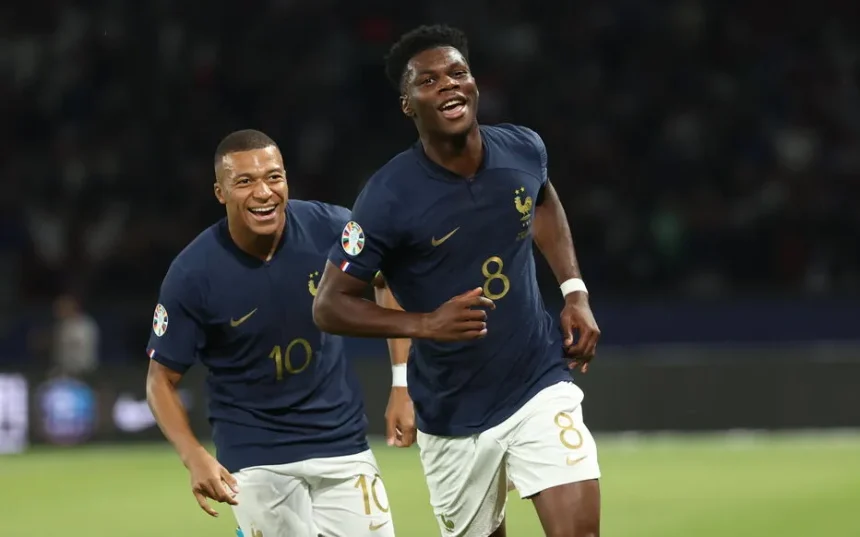Tensions are brewing on the international stage as Real Madrid has taken a firm stance against releasing two of its key players, Kylian Mbappé and Aurélien Tchouaméni, ahead of schedule for national duty with France. The development has sparked heated reactions in both Madrid and Clairefontaine, highlighting the fragile relationship between elite clubs and international federations.
The crux of the issue lies in the upcoming UEFA Nations League semi-final between France and Spain, scheduled for Thursday, June 5. The French national team is set to begin preparations this Friday, but Real Madrid has informed both players that they are not to report for duty until the official FIFA international window opens on Monday, June 2.
According to French outlet L’Équipe, Real Madrid has sent a formal letter to both Mbappé and Tchouaméni, instructing them to use the interim days for rest and recovery following a grueling club campaign. With both players involved in high-stakes matches through May — including the Champions League final — the club is keen to protect its assets.
The decision has not sat well with Didier Deschamps, France’s head coach, who reportedly views the move as disruptive. Still, the seasoned manager has publicly conceded that Real Madrid is acting within its rights. “The clubs are within their rights,” Deschamps stated. “If some clubs choose to release their players only on Monday the 2nd, I won’t be able to do anything about it.”
This public acknowledgement does little to mask the underlying tension. Deschamps has made it clear in the past that he values early preparation, especially when facing formidable opposition like Spain. The absence of two first-choice players until just three days before the match could significantly impact France’s tactical setup and training cohesion.
For Real Madrid, however, the move is strategic. With the club investing over €200 million in Mbappé and having relied heavily on Tchouaméni throughout the season, preserving their physical condition is paramount. The Champions League final, which takes place just days before France’s camp begins, adds another layer of justification for the club’s cautious approach.
Mbappé’s situation is particularly delicate. Having recently signed for Real Madrid, any sign of disobedience to club instructions could tarnish his relationship with his new employers. Yet, the 25-year-old captain of France also understands the symbolic importance of his presence at the national camp, especially as Les Bleus gear up for a potential title.
Meanwhile, Tchouaméni’s fitness has been a concern throughout the season. Although he returned for Madrid’s closing fixtures, he’s still recovering from lingering muscular issues. The club’s medical staff reportedly advised against an early report to the national team, fearing that an intense training load could trigger a relapse.
This episode reflects a growing trend among elite clubs who are increasingly assertive in protecting their players from burnout. With domestic and European competitions already placing enormous demands on athletes, many clubs now challenge the traditional expectation of automatic early releases for international friendlies and warm-ups.
Deschamps faces a tricky dilemma. While legally bound to wait until Monday to demand their attendance, he may still hope that Mbappé and Tchouaméni defy the club’s suggestion and join the squad earlier of their own volition. Such a move would display loyalty to the national team — but also risk friction with their club.
As the clock ticks toward France’s semi-final clash against Spain, all eyes are on Mbappé and Tchouaméni. Will they follow Real Madrid’s directive and rest until the FIFA date, or will they answer the national team’s early call-up and risk club displeasure?
Behind the scenes, the French Football Federation is believed to be in quiet communication with Real Madrid officials, attempting to broker a compromise. However, no official statements have been released to date.
The Nations League semi-final is more than just a tournament game — it is a test of loyalty, endurance, and diplomacy. With stars caught in the middle, the situation underscores the delicate balance players must maintain between club and country.
Regardless of the decision the players make, the incident has already reignited debate over whether FIFA should tighten regulations surrounding player release windows. Some argue that mandatory early access for national teams during competitive tournaments should be formalized to prevent future conflict.
In the coming days, the football world will watch closely to see how this unfolds. The choices of Mbappé and Tchouaméni may not only impact France’s Nations League ambitions but also set a precedent for future relations between elite clubs and national sides.



